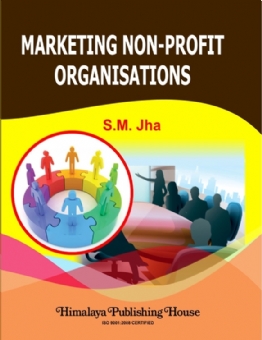Marketing Management for Sustainability Volume I is a guide that bridges marketing strategies with sustainable practices, offering businesses a roadmap to align their efforts with environmental and social goals. The book provides practical insights and real-world examples on how companies can create value not only for profits but also for communities and the planet. It highlights marketing’s potential to drive positive change by fostering consumer engagement, ethical consumption, and brand loyalty. Designed for marketing professionals and entrepreneurs, this guide equips readers with the tools to navigate the evolving landscape of sustainable marketing and contribute to a more sustainable future.
Contents –
1. SUSTAINABILITY MANAGEMENT
1.1 What is Sustainability?
1.2 The Macro Picture of a Sustainable Society
1.3 Economic Sustainability
1.4 Social and Cultural Sustainability
1.5 Environmental Sustainability
1.6 Political Sustainability
1.7 The Micro Picture of Sustainability
1.8 A Model for Individual Development
1.9 Organisational Sustainability
1.10 Social Business Model and Community Business Model
1.11 Paradigm Shifts in the Development of Human Being
1.12 Types of Organisation: Economic vs. Social Concerns
1.13 Towards a Global Sustainable Society
2. MARKETING CONCEPTS
2.1 The Aim of Marketing is to Satisfy Human and Social Needs
2.2 What can be Marketed?
2.3 Types of Markets: Business Models
2.4 Evolution of Marketing Concepts
2.5 Paradigm Shifts in Business and Marketing
3. MARKETING ENVIRONMENT ANALYSIS
3.1 Model for Marketing Environment Analysis
3.2 Macro Marketing Environment (GPEST)
3.3 SWOT Analysis
3.4 Micro Marketing Environment (Individual Players)
3.5 The Changing Trends and Needs
4. STRATEGIC PLANNING FOR MARKETING
4.1 What is meant by Strategy?
4.2 Meaning of Strategic Management Process
4.3 Three Levels of Strategic Planning
4.4 Competency and Core Competency
4.5 Strategies for various SBUs
4.6 Strategic Management Process
5. CUSTOMER SATISFACTION, CUSTOMER LOYALTY, AND CUSTOMER RELATIONSHIP MANAGEMENT (CRM)
5.1 Customer Value or Customer Benefits
5.2 Customer Satisfaction
5.3 Service Quality or SERVQUAL model
5.4 Customer Loyalty
5.5 Total Quality Management (TQM)
5.6 Customer Relationship Management (CRM)
6. CONSUMER MARKETS AND CONSUMER BEHAVIOURS (B2C)
6.1 Consumer Products and Consumer Markets
6.2 Factors Influencing Consumer Behaviour
6.3 Psychological Theories Influencing Consumer Behaviour
7. BUSINESS MARKETS AND BUSINESS PRODUCTS (B2B MARKETS)
7.1 The B2B Markets
7.2 Special Characteristics of Business Markets
7.3 Strategic Alliances or Strategic Partnership in B2B
7.4 The use of Influence Centers in B2B
7.5 Types of B2B Buyers
7.6 B2B Buying Process
8. GOVERNMENT AND NON-GOVERNMENT ORGANISATIONS MARKETS (B2G)
8.1 Government Markets (B2G)
8.2 Non-Government Organisations Markets (NGOs)
8.3 Social Business Model and Community Business Model: Promoting Small Businesses and Community Business Units
8.4 Public Venture Capital and Public Franchise Systems
9. SEGMENTATION, TARGETING, AND POSITIONING (STP)
9.1 Segmentation
9.2 Segmenting Consumer Markets (B2C)
9.3 Segmenting Business Markets (B2B)
9.4 Targeting
9.5 Positioning
10. BRAND BUILDING AND BRAND MANAGEMENT
10.1 Branding at various levels
10.2 Generic Products versus Branded Products
10.3 Brand Building
10.4 Brand Management







